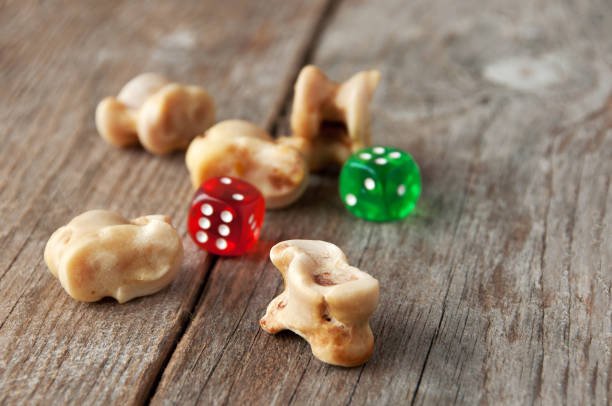
Ancient Origins and Materials:
Early Dice: Dice-like objects have been found dating back as far as 6000 BCE in the form of animal knucklebones (astragali), which were used for both divination and gaming.
Materials: Early dice were crafted from various natural materials including bone, ivory, wood, stone, and even seeds.
Ancient Civilizations: Dice were utilized in various ancient civilizations, such as Mesopotamia, Egypt, Greece, and Rome, for gaming, gambling, and divination.
Examples:
The Royal Game of Ur (Mesopotamia, 3rd millennium BCE) used four-sided dice.
The Egyptian game of Senet (circa 3000 BCE) utilized two-sided throw sticks.
The oldest known dice were found in southeastern Iran and date back to around 2800–2500 BCE.
Evolution of Dice:
Cubical Dice: The six-sided cubical die, which is the standard today, emerged and gained prominence over time.
Standardization: Over the centuries, dice became more standardized, with the six-sided die and the "opposite sides add up to seven" configuration becoming common by the late Middle Ages.
Polyhedral Dice: The use of polyhedral dice with varying numbers of sides, popularized by tabletop role-playing games like Dungeons & Dragons, is a more recent development.
Materials Shift: Modern dice are predominantly made of plastic (cellulose or acrylic).
Uses of Dice:
Gaming: Dice have been used in a wide variety of games throughout history, from board games to gambling games.
Gambling: Dice have been central to many forms of gambling, including games like craps and hazard.
Divination: In ancient times, dice were also used for divination and fortune-telling.

Modern Dice:
Casino Dice: Casinos use precision dice made from durable materials like cellulose acetate.
Tabletop RPGs: Tabletop RPGs utilize sets of polyhedral dice with varying numbers of sides, adding an extra layer of depth and randomness to gameplay.
Custom Dice: There is a growing market for custom dice made from various materials, including metal, gemstones, and wood.
In conclusion, dice have a long and varied history, evolving from simple animal bones to precisely manufactured objects used in a wide range of games and activities.


